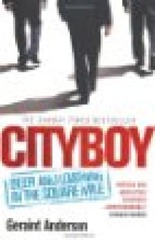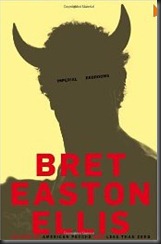There's a whole clutch of books about the financial crisis and the fall from grace of drug-fuelled,  misunderstood city boys and girls and this is probably the daddy of them of all, so if you are going to read any in this new genre, it might as well be this one.
misunderstood city boys and girls and this is probably the daddy of them of all, so if you are going to read any in this new genre, it might as well be this one.
Based on Anderson's The London Paper's column- although narrated by a fictional character clearly for legal reasons- it is essentially an autobiographical tale that takes you on a journey from his [we are assured] 'left-wing hippy days' of University, through the uber-capitalism experience of life as an analyst in Canary Wharf, and back again.
It has to be said there is something compelling about the story- a bit like rubber necking a motorway car crash- and it is written in an almost hypnotic, blokey style that despite your higher nagging sense of taste, keeps you reading until the end.
However that blokey style too often strays into the juvenile, which although no doubt an accurate voice of the type of people making millions in the City, relentlessly applied throughout a book is wearing, as are his quips, jokes and 'amusing' closing time sexist and racist observations which again, as he says, are clearly based on a reality he has stored up from years of a banal existence with the idiots who come out with this rubbish, but they come with such frequency [and often repetition] in the book, that they left this reader exasperated and close to just tossing the book away.
This is a shame because many people probably do just that and miss the overall message of the book, and the really good parts. When Anderson is describing 'sensibly' the machinations of The City and the origins of the recent crash, he is very, very good; lucid and rational in his explanations. Unfortunately though this is too often swamped by a rollercoaster of prose style that too often sinks into banality and a crudeness that isn't clever enough to be funny.
Having said that, if you key into the voice and shrug off the lows, it is more often than not an entertaining- and occasionally gripping- read and although it is difficult to feel sorry for the author at the end of it, I suspect that was not his aim.
There are more stylish and perhaps more emotionally affecting accounts of the self-destructive City lifestyle- Alex Preston's novel 'This Bleeding City' springs to mind- but for an account from the raw, blokeish coalface of The City, this may well be the only book you need to read in a growing library on the subject.
